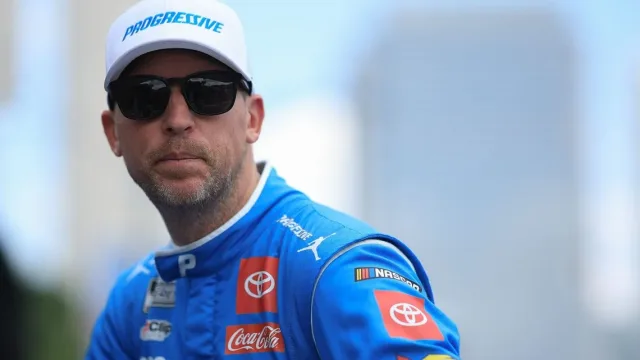NASCAR’s presence in Chicago is at a crossroads, with its future in the city hanging in the balance due to a pivotal contractual option that could determine whether the Chicago Street Race continues. Denny Hamlin on NASCAR Chicago future highlights how a decision on a possible contract extension may impact both the sport and its growing fanbase in the region.
Hamlin’s Ties to Chicago Influence His Perspective
Denny Hamlin serves not only as a top Cup Series competitor but also as the co-owner of the 23XI Racing team, alongside basketball legend Michael Jordan, a figure with deep roots in Chicago. The team’s sponsorships, including McDonald’s, further strengthen their local connections and investment in the area’s sporting culture. Hamlin’s interest in maintaining NASCAR’s presence in Chicago is apparent, and his thoughts were recently shared during his podcast, ‘Actions Detrimental.’
“Walking down the front stretch, you still feel like you’re at a legit racetrack,”
—Denny Hamlin, Driver and Team Co-Owner
On the podcast, Hamlin addressed the uncertainty:
“I don’t know, just hopefully they got a two-year option, I guess on this. Probably, the city has that option. So, they’ll need to talk about it for sure and see if it makes financial sense for everyone above, you know, everyone involved. But I certainly hope that we go back.”
—Denny Hamlin, Driver and Team Co-Owner
This two-year contract extension, part of the original deal between NASCAR and the city, stands as an important variable. While the agreement allowed for three years of racing, it also included a possibility for two additional years. As of now, no announcement has been made about this extension, leaving everyone from drivers and teams to fans waiting for clarity on the race’s future.
Chicago Street Race’s Broad Appeal and Economic Impact
Before the most recent event, Hamlin also commented on the broader effect of the Chicago Street Race, explaining how it has attracted new audiences.
“I can just tell you that non-racing fans at the hotel that I’m staying at are talking about the race.”
—Denny Hamlin, Driver and Team Co-Owner
He emphasizes that the event’s downtown location has introduced the sport to urban communities not traditionally linked to NASCAR, helping broaden its fanbase. Michael Jordan’s significant legacy and the involvement of brands such as McDonald’s play a role in fostering greater local interest, while the race stands as a unique draw for both lifelong enthusiasts and those less familiar with motorsports.
Extension Debate: Dates, Venues, and Community Concerns
With the initial three-year contract completed as of this season, important decisions loom. Officials may consider moving the race to dates outside the Fourth of July weekend to address locals’ concerns, especially around congestion and accessibility in downtown Chicago. Such scheduling could make the event more appealing to city leaders and residents.
Discussions also include the possible return of racing to Chicagoland Speedway, a facility owned by NASCAR about an hour outside Chicago. However, Hamlin dismissed the idea of Chicagoland replacing the street circuit as an alternative.
“Chicagoland is not a substitute for this race,”
—Denny Hamlin, Driver and Team Co-Owner
Compounding his viewpoint, he stated,
“I would like to see us run both.”
—Denny Hamlin, Driver and Team Co-Owner
This perspective underlines the unique attributes of the current street race and its distinct role in serving both the core of Chicago and the wider racing community. Even at this year’s race, personalities such as Derrick Rose, formerly with the NBA and serving as grand marshal, have embraced the sport, showcasing its increased relevance and reach.
NASCAR’s Next Steps and Chicago’s Ongoing Role
Amid speculation about other cities such as San Diego vying to host similar street racing events, the decision on whether to extend NASCAR’s Chicago presence carries significant weight. The sport’s leadership, city officials, and business sponsors must weigh financial considerations and community feedback before confirming the next chapter.
Denny Hamlin’s perspective centers Chicago as a key location in NASCAR’s ongoing strategy to grow its audience and connect with new fans. As the decision on the two-year contract extension remains pending, both the city and the racing community watch closely, understanding that what happens next may set the tone for NASCAR’s future direction in major urban markets.
Our Reader’s Queries
Q. How did Denny Hamlin get so rich?
A. Denny Hamlin started his full-time career in the Cup Series in 2006 with Joe Gibbs Racing. Since then, he has become a racing legend. He has won 51 Cup Series races and claimed victory at the Daytona 500 three times (in 2016, 2019, and 2020). Throughout his career, he has also earned millions.
Q. Why did Denny Hamlin sue NASCAR?
A. Late last year, 23XI and Front Row filed a lawsuit against NASCAR because they wouldn’t agree to new charter renewal deals. They requested a temporary court order to be recognized as chartered teams for this season. However, on Thursday, the Fourth Circuit Court of Appeals in Richmond, Virginia, decided in favor of NASCAR.
Q. How did Denny Hamlin get rich?
A. His earnings from racing, endorsements, team ownership, and real estate have created a $65 million empire. The keys to Hamlin’s wealth include:
✔ Major NASCAR earnings from race prizes and contracts.
✔ Long-term sponsorships with brands such as FedEx, Jordan Brand, and Toyota.
Q. How is Denny Hamlin so rich?
A. Hamlin’s wealth comes from three main sources: his large NASCAR earnings, his sponsorship deals with big brands, and his business interests.
He earns a lot through race winnings and his contracts in NASCAR. Brands like FedEx, Jordan Brand, and Toyota have long-term partnerships with him.
Additionally, Hamlin is a co-owner of 23XI Racing with Michael Jordan, showing his business skills beyond just racing.
